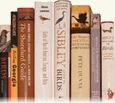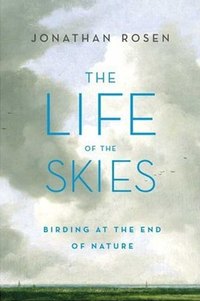Reviewed by Grant McCreary on March 14th, 2008.
Birds are the life of the skies, and when they fly, they reveal the thoughts of the skies.
– D. H. Lawrence
If you are fortunate enough to look upon a Whooping Crane, what do you see? Of course literally you are seeing a bird, about five feet tall, entirely white except for a bare patch of red skin on the head (assuming it’s an adult). But there is much more than just the literal view. You may see it as a tick on your life list. But you are also gazing upon a symbol of conservation success – a creature that faced imminent extinction but was pulled back from the edge of the abyss. It may be that you see a product of the evolutionary forces that has shaped this creature into its elegant form and specific niche in the world. Or instead, you marvel at the divine handiwork of a Creator. Maybe it can at once be all this and more. In the same way, birding is more than just watching birds. As Rosen writes in this book, “It is a way of bridging disparate worlds – continents, the air and the earth, the symbolic and the actual, the scientific and the religious.” This book explores what birding, at its core, is truly about.
There are many books that describe the how, what, when, and where of birding. Pete Dunne’s excellent book on the subject, Pete Dunne on Bird Watching, is even subtitled The How-to, Where-to, and When-to of Birding. But this is the first book I’ve read dedicated to the why. Why do we bird? Why have birds inspired people to watch, read, and write about them?
The author attempts to answer these questions in a unique manner, by examining the practice of birding through history, literature, religion, and personal experience. He mostly does this by looking at notable individuals such as Audubon, Walt Whitman, Henry David Thoreau, Theodore Roosevelt, Robert Frost, Alfred Russel Wallace, and Emily Dickinson. He details their relationship with birds, from Audubon shooting and painting them, to Whitman listening to a mockingbird and capturing it in verse. But even though you will learn much about these people, the point here isn’t to present biographies or a history of birding. Instead, these are all used to see what birds meant to these people, and by extension, us.
Rosen also takes the reader along on some of his own birding trips, including two attempts to see the Ivory-billed Woodpecker. It seems as if everyone is writing about the ivory-bill these days, but it is a bit different here. Again, the point here is why. Why the intensive search? Why does the possibility of the bird’s continued existence matter? But a journey to Israel was perhaps even more prominent. Details of the trip are recounted, along with some of the history of the country, its birds, and conservation. But beyond all of these, the religious aspects were the most important.
Religion figures prominently throughout this book. Rosen, as a practicing Jew, sees religious implications in birding. Moreover, birding can serve as a bridge between the spiritual and the scientific. Religion and science are often considered incompatible and at odds with each other. But they don’t have to be, as the author makes the case here. The full argument is beyond the scope of this review, but it was very refreshing to see this discussed in a frank and rational manner. Rosen was able to articulate what I have often felt, as birding holds spiritual significance for me as well.
The principle thematic undercurrent of the book, however, is probably the importance of birding in our current, naturally diminished world. Robert Frost’s poem, The Oven Bird, is featured highly, especially the last lines:
The question that he frames in all but words
Is what to make of a diminished thing.
Like the Ovenbird in the poem, we must consider what to make of our diminished environment. What is our responsibility? Can we protect both the environment and people?
Recommendation
Scott Weidensaul (author of Of a Feather: A Brief History of American Birding, among others) summarizes this book much better than I could:
Life of the Skies is more than just a bird book. It is a thoughtful and often unexpected exploration of birding through the lens of history, literature and loss—the process, as author Jonathan Rosen says, of loving a diminished but still seductive world.
This is one of the best birding books that I have read, and definitely the most thought-provoking. It will absolutely change your perception of the act of birding. Perhaps you will find that you agree with the author in claiming:
(Birding) isn’t a hobby…It’s a natural, inevitable part of my engagement with the world. It’s my way of answering the question of what to make of a diminished thing.
Disclosure: I get a small commission for purchases made through links in this post.



I have just completed reading “The Life of the Skies” and I agree completely with your review. I found it hard to put down once I started reading it and yet the book invoked the need to take time to savor each chapter. It is one of those rare books that begs to be read over again and again.
I completely agree, Lynn.